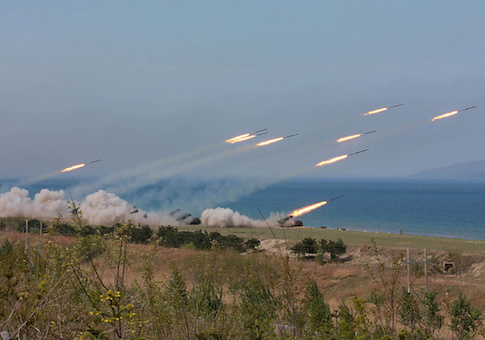The chief of U.S. Pacific Command assured lawmakers Wednesday that the United States is capable of defending an American aircraft carrier strike group deployed in the western Pacific Ocean against any North Korean missile attack despite contrary reports.
U.S. Admiral Harry Harris said he is confident that any weapons Pyongyang would consider deploying to attack the USS Carl Vinson strike group would be "easily" defeated.
"North Korea does not have a ballistic missile anti-ship weapon that would threaten the Carl Vinson strike group," Harris testified before the House Armed Services Committee. "If it flies, it will die," he added about a potential missile strike.
North Korea on Sunday threatened to sink the Carl Vinson aircraft carrier as it began joint drills with two Japanese destroyers headed toward the western Pacific Ocean. North Korean state-run newspaper Rodong Sinmun warned in a commentary that the nation's revolutionary forces were "combat-ready to sink" the Carl Vinson "with a single strike."
Though Harris brushed aside reports suggesting the Vinson strike group is vulnerable to attack, he warned lawmakers that the United States will soon reach an "inflection point" once North Korean leader Kim Jong Un acquires military capabilities that are able to backup his threats.
"We have to look at North Korea as if Kim Jong Un will do what he says," Harris testified. "Right now, there's probably a mismatch between [Kim Jong Un's] rhetoric and his capabilities … but when he threatens the United States with the capability of realizing that threat, that's a different place."
Harris recommended placing ballistic missile interceptors and a new radar system in Hawaii to protect against North Korea's ongoing advancements toward an intercontinental ballistic missile.
The United States currently relies on ground-based ballistic missile interceptors deployed in California and Alaska to protect Hawaii, but regional experts say these defenses would do little to guard U.S. territory in the Pacific against a North Korean ICBM, which officials believe is nearing completion.
The U.S. Missile Defense Agency in February test fired a new SM-3 Block IIA missile from Hawaii that successfully intercepted an incoming ballistic missile, but the Pentagon does not maintain a permanent missile defense installation or detection capabilities on the Hawaiian Islands.
"I believe that the interceptors that we have that defend our homeland directly in Alaska and California are critical," Harris said. "I have suggested that we consider putting interceptors in Hawaii that defend Hawaii directly and that we look at the defensive Hawaii radar to improve Hawaii's capability."
The United States has also accelerated deployment of its Terminal High Altitude Area Defense missile defense system amid growing concerns over North Korea's ballistic missile program. Harris told Congress that THAAD will be operational "in the coming days."
Harris cautioned lawmakers against underestimating the danger of Kim Jong Un, calling North Korea "the most immediate threat" to the United States and its allies in the Indo-Asia Pacific region. The PACOM commander rejected an assessment by Rep. Adam Smith (D., Wash.) that Pyongyang would avoid provoking a full-scale war given the potential costs.
"I'm not as certain about this as you are that North Korea won't do something precipitous," Harris said. "I won't say that they will, but I don't share your confidence that they won't."
President Donald Trump invited the entire Senate to the White House on Wednesday for a rare security briefing on the North Korean threat. The session will be led by Defense Secretary James Mattis, Secretary of State Rex Tillerson, Director of National Intelligence Dan Coats, and General Joseph Dunford, chairman of the Joint Chiefs of Staff.
Trump warned Kim Jong Un earlier this month that "all options are on the table," including military routes, to address ongoing North Korean provocations.
